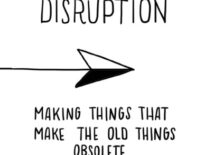
This is one of those frequently heard statements that helps a startup ecosystem recognize that gaps remain. Last week, I pushed founders and economists to recognize the distinction between innovation and technology (between startups and businesses), and from that, I was asked for advice too frequently asked, “How can I capitalize on an app idea I think is innovative enough to be successful with zero startup capital or experience?”
Such a question reveals that gaps exist in your city, sector, or community because such a question is one that should easily no longer exist. And yet it does, because the mentors, entrepreneurship classes, or so-called startup programs (incubators), in the peer group in which you find yourself, are clearly not answering well the most fundamental of questions about startups. We can fault entrepreneurs for lacking all the experience or wisdom they should have, or we can be critical of the community in which they find themselves and help founders at least start off on the right foot. In my experience, this question persists because startup programs are run by people without experience, mentors are really consultants or service providers, and the community is full of good intentions, inevitably mincing business advice with startup counsel.
Let’s illuminate how you can demand better of your ecosystem by answering the question differently than most…
How can I capitalize on an app idea I think is innovative enough to be successful with zero startup capital or experience?
First, you change your peer group and sphere of mentors, because you’re clearly misled.
Ideas are shared. The notion that ideas are unique or owned by you alone, is IP b.s. that lawyers and companies try to spin as reality, in order to sue their way into profits. I’ve worked with startups for 30 years and have never heard an original idea.
How you overcome that issue is than you tell us what it is. Don’t ask for advice about “innovative idea!!” because no one can tell you anything credible about startups, given generic input; and since our question asks about an “idea,” it’s unlikely the founder going to succeed anyway…
Because secondly, you MUST have the team capable of building and competing with whatever it is.
This question asked tells us the founder is on their own. And it’s fine that they are, entrepreneurs all typically start out on their own until joined by others, but it’s that the question is asked that again reveals that the ecosystem of advisors in which this entrepreneur finds themselves, is failing. Sole founders almost never succeed because it’s highly unlikely that they have the skills that correlate with success (or time to do them all alone): build, marketing, and find resources
You can’t do it alone. Anyone you’re working with would know that… hence, you shouldn’t even have this question in particular, unless you are on your own, or inexperienced/incapable.
Don’t take that personally, I’m offering here the more harsh and extreme reality because most advice/answers about this kind of thing are soft assists often garnished with false encouragement and an offer to help (if *ahem* you hire).
Such answers/advice are clearly not helping, because here we are, asking a very familiar and too common question. Simply put, you cannot capitalize on an app idea you think is innovative when you have neither experience nor capital — something is obviously wrong and it’s troubling that no one has told you so.
Let me rip off the band-aid for you since no one else will:
- You can’t do this yourself
- You don’t have the experience or skills to do it, so don’t believe the hype that you could or that trying might work
- People will sell you on their services. Run.
Is that all bad news? Am I being harsh or realistic?
Only if you’re a pessimist with low emotional intelligence. In which case, you won’t succeed either.
If you have the potential to be a successful founder, you’ll take it this advice for what it is: pointing out the reasons you’ll fail, so you’ll stop drinking the cool-aid and instead focus on overcoming those causes of failure BEFORE you waste your time building anything or listening to the false, encouraging advice.
I’m 100% certain this is your circumstance because question ends asking about “startup capital.”
Well, it’s called “venture capital,” and no one ever gets it to start something. All startups (all founders) start by putting in the work necessary to maybe become fundable. No one gets money to start.
Also, something we can expect founders know IF they find themselves in a healthy startup ecosystem with the right peer group and experienced mentors. Hence my first reaction that if you have this question, you need to first change your network of peers.
Why might I explore as advice the causes of failure rather than sharing with someone some tips about what to do if they find themselves in this situation? Again, the question doesn’t provide enough information to know how to actually advise the founder, and given the question, we can know that they are surrounded by the wrong people. What we have to do is first help this founder understand why they’re going to fail so that the harsh reality of getting the right *other* people in place hits home.
You alone must start, and if you can’t do what is known to be required in the success of a startup, you alone still have to put in the work necessary to attract the other people capable…
- Marketing
- Building it
- Bringing the resources to do so
“But I can’t do those things Paul, that’s why I’m asking this question.”
I know. That’s why I am answering it the way I am.
Anyone suggesting you get help to make a prototype of the app is either lying, ignorant, or selling you something. That’s NOT how you start when you have an idea, unless you’re an overconfident CTO who thinks they know everything about solution and that if they just build the thing, people will want it.
“If you build it, they will come,” is only true in movies. It’s how idiot founders fail.
If you can’t do the marketing, which we can safely presume since a marketer wouldn’t have this question, you MUST attract such a person to your team by building it or providing the value to others to fill those roles (funding).
If you can’t build it, which we can also presume, since you’re asking about an innovative idea, instead of just building it, you MUST have that person on your team – outsourcing this stage of work is dumb and will cause you to fail.
Leaving us with considering if the founder with the question could have the funding, experience, or customers for it (resources), to appeal to the others needed for this to be successful. But, since questions about ideas often ask about funding, we can conclude they aren’t bringing resources to the table either.
Have you yet caught on to how entrepreneurs in your community should never even have such a question. Unless they are being misled, they can’t be wondering how to get capital for something that is merely an idea for which they don’t even have the skills or experience to start something. If your community is perpetuating this frustration in entrepreneurs, you aren’t helping; despite your good intentions and those of the people involved, you’re hindering entrepreneurship at the expense of entrepreneurs.
If we know more specifically what the founder is thinking and what they’re capable of doing, we can give good advice. Lacking that, founders shouldn’t even have this question because they should be told clearly, they aren’t going to succeed without changing the people who surround them. These are the three things required to succeed as a startup (marketing, developing, and sourcing resources). An entrepreneur should never ask what they do about an idea, unless your ecosystem is failing to guide them.
What we can do is one guess at good advice and that’s that what everyone can at least be capable of is a bit of marketing, since everyone is capable of that (though they might suck at it). Where this starts and how everyone can capably start, is in what I said about the idea: you must tell people specifically what you have in mind.
If you’re afraid to do so, or seek legal protection of the IP or idea, we, again, know you are going to fail because someone who has the skills and experience to overcome competition, could talk about it without fear of a mere idea being stolen.
Everyone can start marketing by launching a website, a newsletter, or a podcast, and by making that successful enough to have a small community of people (followers on social media), who agree with the thesis, and support a solution. There is no right WAY go about this, but everyone can, somehow. The challenge for founders is that usually YOU don’t want to do this because you don’t like writing, talking about your “idea,” or you don’t like social media.
Well, tough, then go learn code and build it.
Every successful venture requires marketing, developing the solution, or sourcing the resources. Pick one and do it.
What you have to accomplish if you ONLY have an app idea you think is innovative enough to be successful but zero startup capital or experience, is sufficient proof and value for the others to join you.
That is, build an audience of people who want what you have in mind, and maybe someone will join you to deliver the solution, or fund it. If you don’t have that, or the app, you have nothing but an idea… precisely worth what the old saying says, “a dime a dozen.”
If no one has yet told you this, it’s time to find new advisors.






You didn’t mention VCs, but they are just as guilty by sponsoring pitch competitions, accelerators, etc. to help their deal-flow without much consideration of the impact on naive founders. From my personal experience VCs are the most guilty of all ‘advisors’ of pushing the found-and-raise myth. Of course that suits their purpose of exploiting the hard graft of founders to make money for themselves.
Steve Jennis I figured I tend to beat on pretend VCs enough
I wanted to go at ecosystems, startup groups, and cities where this question persists.
Saving this one!!!
Bill Combes cheers. It’s the result of, and has already sparked, a lot of conversation that people aren’t happy with their ecosystem. We can easily do better
Spot on. And it is always harder than you think it will be. It will take longer and cost more.
Advisors can be very sincere with their advice, but they can also be sincerely wrong when they lack domain experience.
One of my favorite posts of yours that I’ve seen in my time knowing you. Well stated Paul.
Cheers Tommy
I’m overdue to say this. We allow too much noise in Texas.
Ideas are a dime a dozen. Many people act like if they have a great idea they are on third base, while in fact they are just getting out of the batters box.
Think before you dish out advice, you can ask which menu you want. The Cheers or Coach menu
The cheers menu will do exactly that, cheer you on because it’s important to hear encouragement. The coach menu will also do exactly that. It sometimes comes with painful truths and honesty so you can see your blind spots and work with the coach to solve them.
I love this Paul. Part of the role of a strong startup ecosystem would be to help people be as rigorous and as intellectually honest with themselves as possible. From here, we might be able to say that there is no such thing as a hard truth. They are just truths. If what someone says seems like a “hard truth, then there is wishful thinking at play. (nothing wrong with this, it happens to almost all of the time. But if a founder could catch themselves at it and open their context to include more of what is really happening, they could be a lot more effective.)
Hmm. I’d be curious to know how does the AI revolution impact your thesis? Since AI increases individual productivity, it might tempt more entrepreneurs to go at it alone. Could that make it harder to get startup teams to join together? It’s already so difficult, especially at the early stages. Or perhaps, could it make team-building more feasible/profitable, due to some (unknown to me) effect? I’d be curious to know if accelerators are feeling an effect from AI on team-building, one way or another.
Peter Sedesse I’m going to need you to sign an NDA
Great point Tinny and coincidental, because I considered adding my experience doing that very thing. I tend to start out with, “Listen, I tend to be known for being critical, and I’ll beat you up the way an investor should. I don’t think there is any value in being nice to you and masking the real problems and red flags in what you’re doing; so, do you want me to do that or would you prefer I be supportive and encouraging?”
No one ever wants me to be supportive and encouraging.
Mark Biw I don’t think AI is a revolution. I think it’s an evolution but not a revolution.
Blockchain / Decentralization is a revolution because it has the potential to disrupt the centralized control and governance over the internet, that has been emerging over the last 20 years (the internet was originally decentralized).
All code, content, and creative works, get commoditized over time. The printing press took the written production of a book, and reproduced it at scale. The MP3 took the analog recording, and digitized it so it can be shared and replayed an infinite number of times without cost. HTML is freely available. Over time, most code becomes worthless … some of it lasts thanks to open source initiatives such as WordPress.
AI is merely doing what a computer and the internet would inevitably do next in any case.
Interestingly. governments are trying to regulate and control it, at the same time that the revolution of infrastructure is making it so that there is nothing any government can do to regulate AI.
AI might tempt more entrepreneurs to go it alone… if they think a startup is a success because of the tools used, they’re in for a painful surprise. Using a tool freely available to everyone else, to build a company, doesn’t make it a startup any more than my using React or Bubble to build a company, makes it a startup. A startup is a distinctly new business model, in the process of being tested to establish whether or not a new venture can become a company that doesn’t yet exist. AI is just a tool…. whatever a person could do technically, an AI can replace. Startups still require marketing and innovative development – building something creative. At least for now, AI doesn’t have free will and its creativity is limited to existing input (which means by definition, not net new); it can’t, without people, launch a startup.
All that said, it could build and run a business. A business isn’t a startup and a startup isn’t a business. We’ve already seen businesses completely run by AI.
I start with an accelerator, Founders Institute, tomorrow! We’re building a simple AI powered tool that enhances musical recordings, making it easy for amateur musicians to get professional-quality results.
Im joining an accelerator to fast track those suggestions. I am a technology program manager and have no experience with start-ups.
Mark Leutwyler very cool. I’ve seen a few efforts to bring that to life so FWIW… focus on competitors, competitive advantage, and marketing marketing marketing. Particularly in media, everything becomes available to artists very quickly – to win as a startup you have to carve out your share as quickly as possible, and target getting acquired before others just build the same thing.
As always, spot on. Thanks for sharing. Again.
re: 5. Be Ready to Market or Build:
I would like to add: Between Building and Marketing, the latter is *at least* 10x more difficult than the former. Human Behavior is (very) hard. No one cares about your idea / product. Those same people are buried under an excess of bottomless noise and endless distractions. Getting through all that, getting their attention, getting someone to care, and then getting them to open their wallet… F**kin’ difficult.
Anyone who suggests overwise is a fool.
I think you’ll find that VCs are behind the scenes of all of those.
? Steve Jennis no. If we want to use a political analogy, crony capitalism doesn’t exists without the politician who allows it.
Blaming VCs for poor ecosystems is blaming the company for a sector being setup and regulated the way it is.
The City can reallocate budgets, steer promotion, and decide what it supports. A University has an open culture of innovation or it locks down IP to try and commercialize it.
These are social/cultural issues
And I am sure that you’ll find two forms of startup investors behind the scenes
1. The actual VCs, who won’t fund such things
2. The people who want to be VCs, and so they’re paying to get their name out there
#2 existing doesn’t mean VCs support this. It means a lot of people with wealth should be kicked out of the ecosystem or told to allocate the money to people who know what they’re doing, instead of trying themselves.
Paul O’Brien I see VCs funding and promoting pitch competitions, accelerators, and founder events all the time, but their motivation is their own deal flow, not the health of the ecosystem or benefit for the founders. Ecosystems need to find support outside of the investment community to be truly founder friendly, but administrations seem happy to leave it to VCs (despite their conflict of interest). I have no problem with VCs being selfish as long as they don’t pretend they are in it to help founders.
Apostol Radev And then of course there’s “luck”. Sometimes things just happen. Right place. Right time. Etc. There’s plenty of experienced advice in the startups’ graveyard. The point is, even domain experience shouldn’t be over-sold / over-bought.
I like the that Mark, and I also believe that we create our own luck by showing up, listening and trying new things! Where I was coming from with my comment is that there is no one size/advice fits all. Conveyor belt style advise or coaching can only do so much. There is a lot of similarities and common principles that we all need to follow as founders, but each business is different and good advice comes from getting to know the people, the product and the business they are building.
Paul O’Brien Thank you! Yes, as part of early proof of concept/zero-cost MVP I’ve been researching the space and available tools. Though we have a secret sauce, there are a lot of groups charging into the space.
Speed will be key.
I hate to say this. If you don’t have experience then what you have is a thought not an idea. Not a concept. Not a plan. It’s the reason “idea guys” are universally despised.
Tim, Before there is a concept or an idea, there is a pain point. Solve it and all the rest is jargon. Yes or no?
No